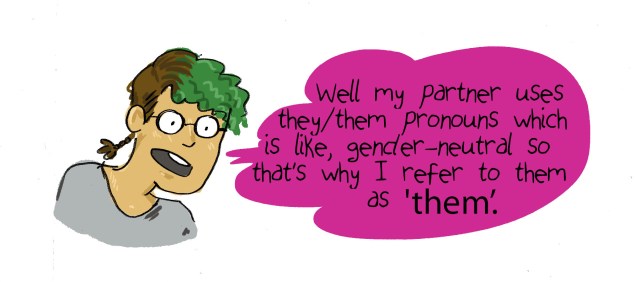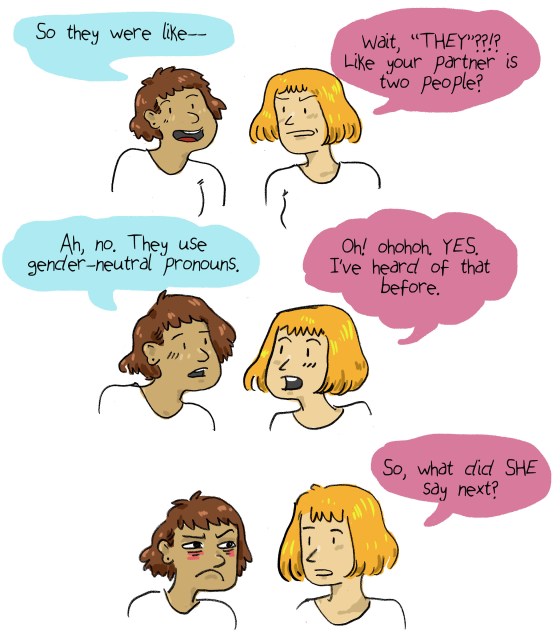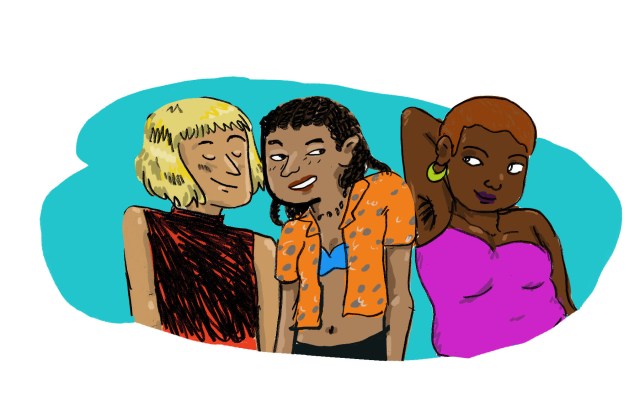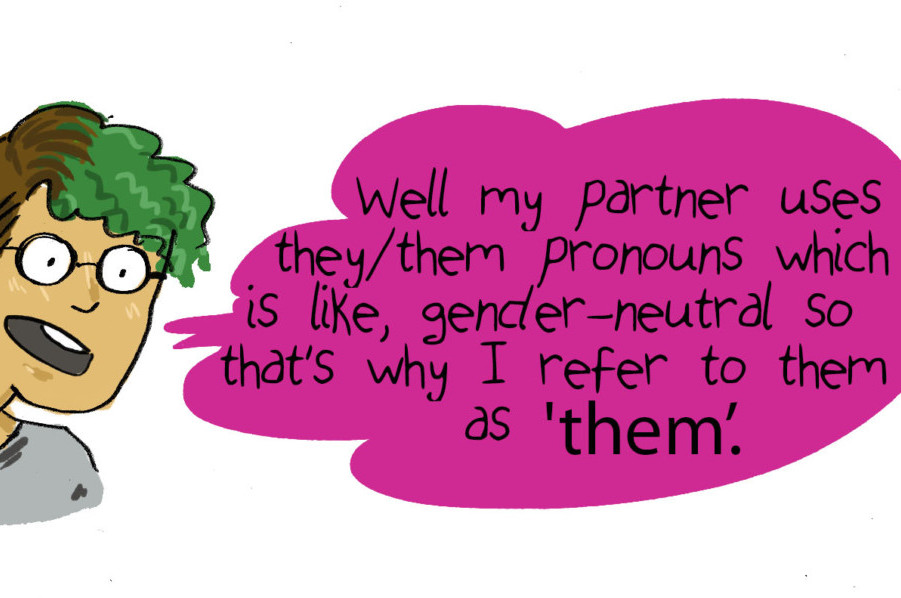by Maddie and Audrey
Welcome to You Need Help! Where you’ve got a problem and yo, we solve it. Or we at least try.
Q:
My awesome partner is thinking about going by they/them pronouns. I’ve found it easy to use these in queer spaces, but a lot harder to use it around straight cis people with limited genderqueer/trans knowledge. My partner presents pretty femme so people usually are confused when they don’t use she. I want to be supportive, but I’m anxious about introducing the topic to older relatives. Most internet stuff is directed toward the person going through the identity changes, and rightfully so, but some guidance on how I can help my partner navigate this would be rad.
A:
Hello wonderful person! We, Audrey and Maddie, have teamed up to offer you some ideas and feedback. Audrey is a genderqueer human whose identity mostly involves waving their arms in the air and running away. They use they/them pronouns and tolerate she/her pronouns. Maddie is a queer cis woman who uses she/her pronouns. She has talked to her family a bunch about using they/them pronouns correctly for her partners and friends.
Audrey: Sweet letter writer, I want to tell you that your partner is very lucky to be with someone who genuinely wants to affirm them even when the going gets tough. I hope you don’t mind if I frame this in terms of my own experience, because in some ways, my partner Wynn is a better advocate for me than I am for myself. I tell a lot of people about my pronouns, but I rarely correct them if they use she/her because of a brutal mix of insecurity, anxiety and my compulsion to make others feel comfortable at my own expense. In fact, I’m much more likely to correct people about other people’s pronouns than my own. But around Wynn’s coworkers, family and friends, she gently and consistently reminds them of my pronouns every single time. She teaches her older gay male colleagues about genderqueer and non-binary identities and gender-neutral pronouns. When we’re at check-out counters, she refers to me with they pronouns whether the clerk looks confused or not.

This makes life easier in a lot of ways, but there’s also this: Wynn’s loving and determined use of the pronouns I like best makes me believe that I might just deserve to feel that good. She makes me feel brave about telling my friends and reminds me that I have the power to ask and perhaps some day even insist that people follow through. But she also never pressures me or judges me if I’m in a space where I don’t feel comfortable or safe using they pronouns. If we are in a new environment or around my family, she always checks in about what I want her to do in that space. It’s a kind of solidarity I never knew I could have in a partner, and it blows my mind.
Sweet letter writer, I can tell from your letter that you want to be that kind of partner, and I promise you it’s possible. Not everyone will get it, but most people — unless they’re confrontational assholes — will just accept what you tell them. They may not “believe” it, whatever that means, but most people will do what you ask even if it’s not in good faith. In a way, it’s easier coming from you. They can’t as easily argue with you, devoted partner, about someone else’s gender. You and your partner could work together on a 1-3 sentence explanation you can use, kind of like an elevator speech. It can be something like this:
“Just so you know, like many people, my partner uses they/them pronouns, which have been used as a singular pronoun for centuries. I realize this may be hard for you to understand or remember, but it’s really important to both of us that you make an effort.”
In that vein, it’s definitely ideal for you and your human to discuss just how hard you should push. Do they want you to correct people in front of them or in the middle of a conversation? Or would they rather you pull someone aside or text that person to remind them about your partner’s pronouns?
One of the most important things you can do is affirm your partner. It sounds like they are still in the process of deciding how to navigate pronouns and what feels right to them. They probably won’t need you to tell your sweet great grandma right away, ya know? This is a journey you two can take together, and you will both learn a lot, screw up some, and find the ways that feel right and work for you. If they are feeling hurt by people who don’t want to use their pronouns or just by a long day of having to gender in the world, listen to them and ask how you can help ease the stress.
Maddie It’s true. You probably won’t need to explain this all to your sweet great grandma tomorrow, but at some point, depending on your partner’s needs, that might become the thing that needs to happen. I have had conversations with 3/3 living grandparents about gender-neutral pronouns in various contexts, over multiple years, making reference to multiple partners and friends. There are a lot of ways for that conversation to go.
From my experience, even the most well-intentioned, liberal, gay-friendly older people have no idea how to deal with gender-neutral pronouns when they learn about them for the first time. (Honestly, they don’t even have to be that old.) What I’ve discovered is that with older relatives, if you want them to use the right pronouns for your partner, you’re probably going to need to make some time to have a real conversation (or several real conversations) with them. Otherwise, they will be confused and default to gendering everyone the way they’re used to doing.
When you do sit down with your relative, don’t make the conversation confrontational. This is not a test for your parents or grandparents. It’s about making your family a safe place for your partner. Chances are, your relatives want your partner to feel welcome, and using your partner’s correct pronouns are a way for your relatives to extend that welcome.
First of all, make sure you introduce the concept of “they” as a singular pronoun. The elevator speech Audrey explained is awesome. If you just say, “My partner uses they pronouns,” it will probably not get through. I’ve done this in the past, and I have had a variety of reactions, ranging from completely ignoring me, to a who’s-on-first-esque conversation where my family thought my partner identified as more than one person, which was not the case.
Give your relative some examples. Tell them other things about your partner using the singular they and them, both so your relatives get used to hearing they/them and so they know more things about your partner than what their pronouns are. Even though we do use the singular they all the time without thinking about it, it’s important to affirm that adapting to it is a learning process. Explain that if they mess up, it’s not the end of the world.

Your relative will likely have questions. Answer them if they are reasonable. Respectfully and emphatically refrain from answering questions about the gender your partner was assigned at birth or what genitals they have, unless your partner has explicitly told you they want these types of questions answered. These are really personal questions and not appropriate for you to share, and that’s all you need to say in response, no matter how curious someone may be.
In my own experience, I’ve had family members who aren’t against my partner’s gender, per se, but who have had suggestions of other pronouns or approaches to gender my partner could adapt. If this comes up, tell your relative to get over themselves in the nicest way you can. Explain that your partner’s pronouns are not a rhetorical exercise or puzzle. Remind your relative that making you and your partner feel welcome in the family is more important than stubborn feelings on grammar. Point your relative to articles that point out that the singular “they” is used all the time, and that the argument that the singular “they” is incorrect is misguided and irrelevant.
There is also the possibility that some of your family members are excited about your partner, eager to be supportive, but just cannot remember or internalize an unfamiliar way of speaking because they are old and their brains aren’t wired to learn in that way anymore. Audrey and I experienced this recently, when they came to visit me and we stayed with my grandmother. (FTR Audrey and I aren’t partners, but all this stuff still applies with best friends.)
Audrey It’s true! Maddie handled it in a way that made me feel really safe. First, she asked me in advance how I wanted me her talk to her grandmother about my pronouns. We agreed that the most important thing would be to make her aware of my chosen pronouns and explain that Maddie would be using they/them for me. Maddie had the conversation before our trip, and Phyllis admitted that it would be really hard for her to remember. In the end, Phyllis referred to me with she/her pronouns the whole weekend, and Maddie used they/them. This was fine! But also, this may not work for everyone. In my case, she/her is not ideal and always catches my ear funny, but I don’t experience it as misgendering. However, if your partner, now or in the future, feels like they/them are the only appropriate pronouns, you will have to figure out other strategies to help the people in your life get it right. Share the load with your partner and take the heat when necessary.
Maddie We’ve mostly focused on the mechanics of introducing they/them pronouns to family members, but you also mentioned that your partner is femme and that people are sometimes confused when they don’t use she. This is really important to be aware of and ready for. When it comes to your older relatives, they likely won’t have internalized the false assumption common to queer communities that nonbinary identities and they/them pronouns connote masc-of-center presentation. But as my femme nonbinary partner pointed out to me, you still might hear “but your partner looks like a girl!” because people generally have a hard time with the distinction between what is femme and what is female. You can do the work of helping your family understand nonbinary identities in a framework that honors and lifts up your partner and their gender.

Finally, after you’ve had conversations with your family and it comes time for your fam and your partner to share space, try not to make it weird! Use their pronouns as you would in everyday conversation, without flinching or pausing. Don’t lose sight of the fact that the point isn’t for your relatives to pass a test on pronouns. The point is to help your family build the tools they need so that your partner feels safe and welcome around your relatives.








Comments
I can related to Audrey with the anxiety, the compulsion to make others feel comfortable, and in some cases my own safety. Your partners are all lucky to have someone that respects their pronouns/gender. This will be great resource of many, thank you!
This would be a more helpful article if the author hadn’t made several ageist comments. I’m a 73-year-old great grandmother and have a grandchild who is transgender. I have no problem at all using the pronouns of that child’s choice. I do, however, have a problem with people who think I would have a problem just because I’m “old!” Prejudice comes in many forms.
Legit. I think that the particular language of the singular they is something a lot of people outside of our world haven’t encountered – I explained it to a cousin in his twenties the other day when he asked about it – and I don’t think that older people are categorically less likely to accept that people fall outside of normative gender expectations. After all, it’s just new language for ways that people have been living forever…which is something that we sometimes forget, I think?
note: didn’t mean “particular language” in a sense like it’s being very particular to id as ‘they.’ i should used the word ‘specific.’
i meant ‘should HAVE,’ good lord
words, i have many words, great words
You have the best words
I totally agree. That rubbed me the wrong way too. I have friends and students older than my parents who are able to remember my pronouns all the time.
Furthermore, it’s also ableist. With so many conditions that affect cognition (like fibromyalgia, autism, depression, etc) young people can have problems remembering pronouns. Even with my own pronouns being they/them I can forget other people’s pronouns on my bad days.
Hi S! There are definitely people of all ages who work hard to be respectful and caring about pronouns, and people of all ages who really struggle to remember/use the right pronouns for people, and people of all ages who are jerks about it. Your grandchild is very lucky to have you!! In the piece, we were specifically aiming to speak to this question asker’s concerns as well as speak from our own experiences. We are sorry that it seemed like we were painting all older people in a negative light. xo
Thank you so much for this article. I have also been wondering how to better explain or correct pronouns when talking with my family about my agender bestie. It also made me hopeful, in terms of my own questioning, about the kind of affirmation that can come from a good friend or partner – that, as Audrey beautifully puts it, perhaps with a little help from my friends I, too, can “believe that I might just deserve to feel that good” and worry less about making others comfortable at my expense.
In terms of the age issue, I agree that getting used to they/them or other gender-neutral pronouns is an adjustment for people of many ages who aren’t immersed in communities where that language has caught on. I hadn’t touched anything related to sexuality or gender identity with a ten-foot pole before starting to come out to myself a few years ago, so my first thoughts on seeing singular they/them, -x, and -@ were “what even IS that?” and “that looks so weird/wrong!” It took time for me to get in the habit of using they/them deliberately and not just in colloquial slips. -X took less effort, but I still don’t know how to pronounce it in Spanish conversation.
Ultimately, though, it came down to feeling that keeping my friend comfortable was much more important than keeping every little (traditional) grammar rule. Maddie makes such an important point that it is not a test or a puzzle, but a way of making your friend/partner feel welcome.
This was a very timely article because on Saturday I’m going to my good friend’s wedding, and I need a way to get my family to stop referring to his genderqueer partner as his wife or his bride.
I’m also super interested to see what they do with the ceremony, because their families are both pretty religious, and marriage ceremonies are pretty fucking hetersexist and gendered.
This is a practical and useful article
Congrats on a job well done
Thank you thank you!
Love this website and am using this article to help my bestie who uses they/them pronouns.
They – a commonly used plural pronoun and usurp it to be gender neutral singular-how screwed up is that.
Where is your partner? They went to the store. how many do you have?
They/them easy to use in queer spaces, what do you use in gay places, or bi places or pan or trans or 2spirited or…places.
Moderators please remove this comment (it’s spam/irrelevant)
This is so, so helpful! Thank you.
My partner and I were together for six months when they came out to me as gender fluid. They had already met my family and spent a lot of time with my parents. My family absolutely adores my partner, and my mom jokes that she likes them better than me. But I want them to to feel comfortable around my family. I know my parents won’t be bothered or judgmental or anything, I just haven’t been able to figure out how to bring up the conversation with them yet. So thank you for the tips, I’ll definitely speak to my partner about this and use some of this advice for approaching the conversation.